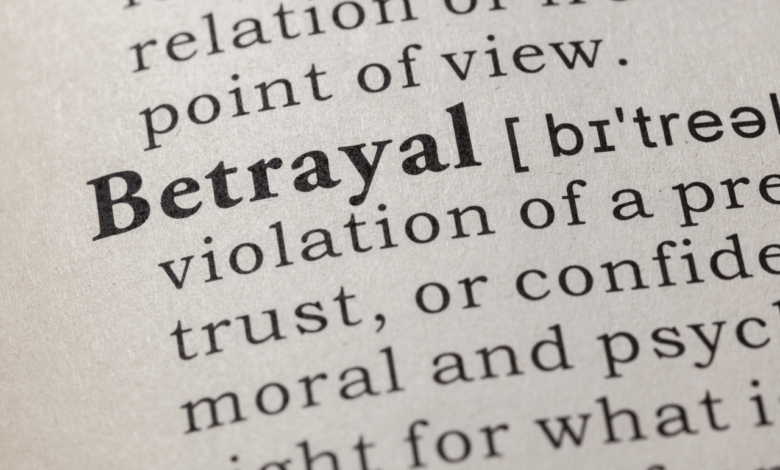Top 15 Family Betrayal Quotes: Explore Pain and Healing – Mindsterk

Betrayal is a heart-wrenching experience, and when it comes from those closest to you, the pain can be excruciating. Family betrayal shatters the foundation of trust, leaving you feeling vulnerable and questioning the very relationships you hold dear. It’s a complex emotional landscape that demands acknowledgement and understanding.
Families are meant to be havens of love, support, and unwavering loyalty. However, the harsh reality is that even the strongest bonds can be tested by deceit, lies, and selfish actions. Family betrayal can take many forms, from infidelity and emotional manipulation to financial exploitation and broken promises.
The consequences of family betrayal are far-reaching. They affect not only the individuals involved but also the dynamics of the entire family system. It can leave deep emotional scars, erode self-esteem, and create an atmosphere of mistrust that lingers long after the initial betrayal.
Impact of Family Betrayal:
Emotional and Psychological Impact
The impact of family betrayal can be profound and long-lasting. It can manifest in various ways, both emotionally and psychologically. You may experience a range of intense emotions, including anger, sadness, confusion, and a sense of profound loss.
Erosion of Trust
One of the most significant impacts of family betrayal is the erosion of trust. When those closest to you violate your trust, it can be challenging to rebuild that foundation. Trust is the bedrock of any healthy relationship, and its absence can create a rift that seems insurmountable.
Isolation and Loneliness
Furthermore, family betrayal can lead to a sense of isolation and loneliness. You may feel disconnected from those who were once your support system, leaving you to navigate the aftermath alone. This isolation can exacerbate feelings of vulnerability and heighten the emotional turmoil.
Coping with Family Betrayal
Coping with family betrayal is a journey that requires resilience, self-compassion, and a willingness to heal. While the path may be arduous, there are strategies that can help you navigate this challenging terrain.
Acknowledge Your Emotions
Betrayal evokes a whirlwind of emotions, and it’s essential to allow yourself to feel them fully. Suppressing your feelings can prolong the healing process and lead to further emotional distress.
Seek Support
Confiding in trusted friends, seeking counselling, or joining a support group can provide a safe space to share your experiences and receive validation and encouragement.
Practice Self-Care
Prioritize your well-being by engaging in activities that bring you comfort and joy. This could include exercise, mindfulness practices, or pursuing hobbies that allow you to reconnect with yourself.
Set Boundaries
Establishing healthy boundaries with those who have betrayed you can help protect your emotional well-being and prevent further harm.
Consider Forgiveness
While forgiveness is a personal choice and may not be appropriate in all situations, it can be a powerful tool for healing. Forgiveness does not condone the betrayal but rather allows you to release the burden of resentment and move forward.
Quotes on Family Betrayal:
Throughout history, writers, poets, and philosophers have grappled with the profound pain of family betrayal. Their words serve as a poignant reminder that you are not alone in your struggle and that the human experience transcends individual circumstances. Here are some powerful quotes on betrayal by family that capture the essence of betrayal within the family:
“The most painful thing is losing yourself in the process of loving someone too much, and forgetting that you are special too.” – Ernest Hemingway
“The closer the relation, the nearer the betrayal.” – Marlon Brando
“The worst kind of hurt is betrayal because it means that someone was willing to hurt you just to obtain something better for themselves.” – Mel Robbins
“Betrayal is the only truth that sticks.” – Arthur Miller
Powerful Family Betrayal Quotes and Their Meanings
“The betrayal of a family member is the most painful of all.” – Marlon Brando
This quote encapsulates the profound anguish found in many family betrayal quotes. Family is meant to be a sanctuary, and when that sacred trust is violated, the pain cuts deeper than any other form of betrayal.
“Betrayal is never easy to handle and there is no right way to accept it.” – Christine Feehan
Feehan’s words acknowledge the complexity of betrayal and the absence of a universal blueprint for coping with it. Each individual’s journey through betrayal is unique, and there is no prescribed path to acceptance.
“The saddest thing about betrayal is that it never comes from your enemies.” – Anonymous
This anonymous quote poignantly highlights the fact that betrayal is often perpetrated by those we least expect – the very people we trust and hold dear. It is this violation of trust that makes betrayal from family members so devastating.
“Betrayal is the only truth that sticks.” – Arthur Miller
Miller’s quote suggests that betrayal leaves an indelible mark, a truth that cannot be erased or forgotten. It becomes a part of our lived experience, shaping our perceptions and relationships moving forward.
“Betrayal is common for men with no conscience.” – Toba Beta
Beta’s quote implies that those who betray lack a moral compass. They act solely in their own self-interest without regard for the consequences their actions may have on others, even their own family members.
Betraying Family Quotes That Resonate with Emotions
“The saddest thing in the world is loving someone who used to love you.” – Anonymous
This quote captures the heartbreak of betrayal by a loved one, particularly within the family dynamic. It highlights the profound sense of loss and longing for the love and connection that once existed.
“Betrayal is the only truth that sticks.” – Arthur Miller
Miller’s powerful quote resonates with the enduring emotional impact of betrayal. It suggests that the pain and mistrust linger long after the initial act, becoming an inescapable truth that shapes our experiences.
“The worst pain in the world goes beyond the physical. Even further beyond any other emotional pain, one can feel. It is the betrayal of a friend.” – Heather Brewer
While Brewer’s quote refers to the betrayal of a friend, it can be applied to the profound anguish of betrayal within the family unit. The pain transcends the physical realm, cutting deep into the emotional core and shattering trust.
“Betrayal is the only truth that sticks.” – Arthur Miller
Miller’s quote is so impactful that it bears repeating. It encapsulates the enduring nature of betrayal, a truth that cannot be easily erased or forgotten, leaving an indelible mark on our psyche.
“The most painful goodbyes are the ones that are never spoken and never explained.” – Anonymous
This anonymous quote resonates with the emotional turmoil of betrayal, particularly when it is left unaddressed or unexplained. The lack of closure can prolong the healing process and leave lingering questions and doubts.
Healing from Family Betrayal:
Healing from family betrayal is a journey that requires time, patience, and a commitment to self-care. It is a process that cannot be rushed. There may be setbacks and moments of struggle. However, with the right support and strategies, it is possible to emerge from the pain of betrayal with renewed strength and resilience.
Allow Yourself to Grieve
Betrayal is a loss. It is essential to honour the grief that accompanies it. Embrace your emotions, cry if you need to, and give yourself the space to process the pain.
Seek Professional Support
Counseling or therapy can provide a safe and non-judgmental space to explore your feelings, work through the trauma, and develop healthy coping mechanisms.
Practice Self-Compassion
Betrayal can lead to self-doubt and negative self-talk. Counter these thoughts with kindness and understanding. Remind yourself that the betrayal is a reflection of the perpetrator’s actions, not your worth.
Cultivate Healthy Relationships
Surround yourself with individuals who exemplify trust, loyalty, and emotional support. Positive relationships can help restore your faith in human connections and provide a foundation for healing.
Embrace Personal Growth
While betrayal can be a devastating experience, it can also serve as a catalyst for personal growth and self-discovery. Use this opportunity to explore your values, boundaries, and the qualities you seek in healthy relationships.
Moving Forward After Family Betrayal:
Moving forward after a family betrayal requires a conscious decision to release the burden of resentment and embrace a path of healing and personal growth. While the journey may be challenging, it is a necessary step towards reclaiming your emotional well-being and creating a life filled with meaningful connections.
Redefine Your Boundaries
Betrayal often prompts a reevaluation of personal boundaries. Take the time to reflect on the boundaries you need to establish to protect your emotional and physical well-being.
Rebuild Trust
Trust is a fragile commodity that can be shattered by betrayal. While it may take time, actively work towards rebuilding trust in healthy relationships and within yourself.
Cultivate Forgiveness
Forgiveness is a personal choice and may not be appropriate in all situations. However, if you find the capacity to forgive, it can be a powerful tool for healing and releasing the emotional weight of resentment.
Embrace Personal Growth
Betrayal can be a catalyst for self-discovery and personal growth. Use this experience as an opportunity to explore your values, strengths, and the qualities you seek in healthy relationships.
Create New Traditions
If the betrayal has fractured your family dynamics, consider creating new traditions and rituals that align with your values and provide a sense of connection and belonging.
Finding Support After Family Betrayal:
Navigating the aftermath of a family betrayal can be an isolating and overwhelming experience. However, it is crucial to recognize that you do not have to walk this path alone. Seeking support from trusted sources can provide a lifeline during this challenging time and aid in the healing process.
Confide in Close Friends
Share your experiences with friends you trust implicitly. Their empathy, validation, and non-judgmental listening can offer comfort and a sense of belonging.
Join a Support Group
Connecting with others who have experienced similar betrayals can provide a safe space to share your story, receive understanding, and gain practical coping strategies.
Seek Professional Counseling
A trained therapist or counsellor can provide invaluable guidance and support as you navigate the complex emotions and challenges associated with a family betrayal.
Explore Online Resources
Online forums, blogs, and support communities can offer a sense of connection and valuable insights from those who have walked a similar path.
Lean on Your Spiritual Beliefs
For those who find solace in faith or spiritual practices, engaging in these activities can provide a source of strength and hope during difficult times.
Remember, seeking support is a sign of courage and a commitment to your own well-being. Embracing a supportive network can help you feel less alone and provide the resources necessary for healing and personal growth.
Conclusion: Embracing Forgiveness and Growth
Family betrayal is a profound and painful experience that can shake the very foundation of trust and belonging. However, it is important to recognize that this experience does not define you or your future. With time, self-compassion, and a commitment to healing, it is possible to emerge from the ashes of betrayal with renewed strength and resilience.
Embrace forgiveness, not for the sake of those who betrayed you, but for your own emotional well-being. Forgiveness is a personal journey that can liberate you from the weight of resentment and anger, allowing you to reclaim your inner peace and move forward with a renewed sense of purpose.
Remember, growth often emerges from the most challenging experiences. Use this opportunity to redefine your boundaries, cultivate healthy relationships, and explore the depths of your inner strength. Embrace the lessons that this experience has taught you, and allow them to shape a more authentic and empowered version of yourself.
As you navigate this journey, surround yourself with a supportive network of trusted individuals who can offer encouragement, validation, and practical guidance. Remember, you are not alone, and there is strength in seeking support.
Ultimately, the path to healing from family betrayal is a personal one, but it is a journey worth undertaking. By embracing forgiveness and growth, you can reclaim your emotional well-being and create a life filled with meaningful connections, self-compassion, and a renewed sense of purpose.
FAQ
What are family betrayal quotes?
Family betrayal quotes are expressions, often from literature or personal reflections, that capture the pain and emotions experienced when a family member betrays another.
Why do people seek out family betrayal quotes?
People often look for these quotes to find solace, understand their feelings, and relate to others who have experienced similar situations. They can also be used for personal reflection or to share with others who might be going through the same thing.
Can a family betrayal quote help in healing from a betrayal?
Yes, reading and reflecting on these quotes can provide emotional support and a sense of understanding. They can help people feel less alone in their experiences and offer a way to articulate their feelings.
Are family betrayal quotes only negative?
While many family betrayal quotes express pain and disappointment, some also offer hope and insight into overcoming betrayal and rebuilding trust.
Where can I find family betrayal quotes?
You can find family betrayal quotes in books, online quote databases, social media, and websites dedicated to quotes and sayings. Some may also be found in articles and essays discussing family dynamics and personal experiences.






